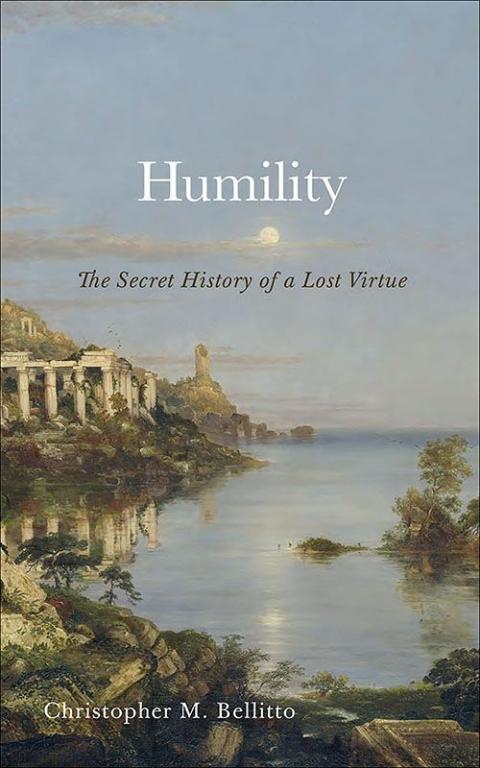The upper portion of the sculpture Saint Ignatius Loyola, by Juan Martínez Montañés and Francisco Pacheco, is seen in the exhibit "The Sacred Made Real" at the National Gallery of Art in Washington Feb. 24, 2010. St. Ignatius of Loyola, whose feast day is July 31, taught that God is present in all things. (CNS/Nancy Wiechec)
Editor's note: This essay is adapted from Christopher M. Bellitto's Humility: The Secret History of a Lost Virtue with permission from Georgetown University Press.
Some people are born humble. Others have humility thrust upon them. That's what happened to Ignatius of Loyola (1491-1556), whose feast is celebrated each year on July 31, the day he died. His path to humility is an instructive one for recovering this great but lost virtue.
Born to well-off nobility in the fiercely independent Basque region of Spain, he was named Iñigo and later changed his name to Ignatius after a life-changing injury that opened his eyes and eventually led him to establish the Society of Jesus, called the Jesuits, with some companions in 1540.
He spent the first part of his life deliberately embracing pride, arrogance and hubris. Before that catastrophic wound and its barbaric aftermath, he was the youngest son who needed to prove himself. He was brought up as a courtier and young knight in influential circles. In his 20s, Iñigo visited the royal court of King Ferdinand II of Aragon, the widower of Queen Isabella I of Castile who had financed Columbus' voyages.

Christopher M. Bellitto is author of Humility: The Secret History of a Lost Virtue. (Courtesy of Georgetown University Press)
The young Iñigo's loves were the standard wine, women, song, brawling and gambling, and glory in battle stirred up by troubadours' stories of chivalry and adventure. In his 60s, he dictated an autobiography in Spanish where he referred to himself in the third person: "Up to the age of twenty-six he was a man given to the follies of the world; and what he enjoyed most was exercise with arms, having a great and foolish desire to win fame."
He was also thick-headed. His Aunt María saw through his stubbornness. "Iñigo," she told him, "you'll never learn sense until someone breaks one of your legs."
That's exactly what happened. In a spectacular example of the downside of the pursuit of pride, Iñigo led an idiotic attempt in May 1521 to defend Pamplona with poor fortifications against French forces that outnumbered his — perhaps up to 10 to one. His own brother took one look at the odds and ran away. The kid brother, as always craving attention and stardom, galloped straight ahead. Iñigo would not be shamed into surrender.
A cannonball ripped between Iñigo's legs, shattering one and damaging the other. Treated at the scene by the French, who released him two weeks later, he was eventually brought home to Loyola. There was a poor attempt to reconstruct the legs, which he described as butchery. Iñigo noticed his right leg had healed improperly and was now shorter than the left. A bone had knit to overlap another, leaving an unsightly bump that would make his legs unattractive in fashionably tight hose and boots — "an ugly business" that would hurt his worldly rise: "He could not bear such a thing because he was set on a worldly career and thought that this would deform him."
The doctors said the operation would hurt tremendously and be followed by a painful convalescence of stretching the bone. Iñigo ordered the surgeon to re-break the leg and saw the bump away. A lifelong limp was a daily memento of where his arrogance had led.
Over time [Ignatius] began to see that service was not humiliating, but dignified.
Just as his Aunt María predicted, that broken leg knocked sense into him. It forced Iñigo to see what pride had produced. As he lay in bed for weeks and then months while his leg was being stretched, he asked to read the familiar books of chivalry that he had loved as a youth. None were around, so someone handed him a life of Jesus and a book on the saints translated into Castilian. They made him ask: What if I lived my life humbly for others with the same fervor that I've been living my life proudly for myself?
This episode changed Iñigo's life, but it took years to turn from the vice of hubris to the virtue of humility. Iñigo had to start from scratch. He had to humble himself to accept his ignorance about the new path. The former chivalrous knight had to be taught like a child. The life of service he envisioned after the cannonball meant the world would no longer revolve around him.
He realized he needed to learn Latin to pursue the higher education necessary for his new life of service. His education in letters had not been up to the same level as his training in arms, so at age 33, the disabled war veteran squeezed onto a bench with boys, like a parent today squishing into a third-grader's desk at parent-teacher night. There, in what we would call an elementary school in Barcelona, he started Latin 101, conjugating verbs and declining nouns with young boys likely wondering what he was doing there.
Over time he began to see that service was not humiliating, but dignified. To serve the poor, he had to be poor. What he sought, in a Spanish expression, was humilidad amorosa: a loving humility honed by practice that developed into habit. Humility taught him to be giving, which he hadn't been, and not grasping, which he had. He needed lots of help, and he learned to ask for it with eagerness and not begrudgingly. After all, he was a complete novice in the worlds of learning, service and spirituality.
Ignatius, who had taken up this name after he moved to Paris for advanced studies in his late 30s, had long been keeping a journal of the insights he received in prayer plus his feelings about these experiences. He gathered these notes together into what are called The Spiritual Exercises, a book not to be read leisurely, but a manual for the director of a retreat. There he identified three degrees of being lovingly humble.
In the first degree, you follow God's law in order to make good, moral decisions. The second degree of humility is to be open to whatever comes your way. This is often called "indifference," but that doesn't imply a bland not caring one way or the other — chocolate or vanilla, it doesn't matter, whatever. For Ignatius, indifference means that you deliberately detach yourself from improper, self-absorbed, selfish desires that put you first totally and always. It's a way of turning "me first" into "you first." You express your wishes but go where you're sent.
The third degree of humility, which he says is the most perfect and so the hardest to achieve, is that you routinely choose the right path instead of simply submitting in obedience to another person's authority or being indifferent.
Advertisement
It's an equation: The first plus the second degrees of humility equal the third and highest level. You humbly choose openness and service freely as an attitude and a habit rather than degrading yourself in humiliation or looking for praise.
It's very easy to dismiss Ignatius as a religious militant with a psychological self-esteem problem. When you read how Ignatius acted in the 20 years between his wounds and the time when he and his first companions established the Jesuits, you notice that he tends to extremes, but they mitigate gradually. Because he was open to learning about humility from others who knew more about the type of service and education he intended, he learned to modify his habits to serve a larger purpose.
When he was studying in Barcelona and then in Paris, he found that fasting made him dizzy and messed up his study habits. He allowed himself to daydream about spiritual matters when he should have been paying attention in class. Ignatius saw that something was wrong, so he decided to seek out people who knew better, like scholars and masters of prayer. There's a time for prayer, they told him, but it's not during a lecture. If fasting too much harms your health and your sleeping, then it's interfering with studying, which is your primary job here and now. So, dial down on the fasting. And so he did — and the rest, as the saying goes, is history.
Humility gave Iñigo the courage and confidence to become Ignatius.








